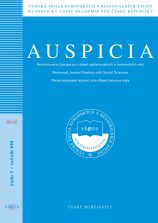Sociální strukturaa její projekce do volebního chování v komunálních volbách – případová studie města žatce
Social Structure and Its Projection into Voting Behaviour in Communal Elections – Case Study of Town Žatec
Author(s): Radek Kopřiva, Jan ČopíkSubject(s): Electoral systems, Politics and society, Behaviorism
Published by: Vysoká škola evropských a regionálních studií, z. ú.
Keywords: elections; voting behaviour; social-structural model; voter; municipal council; social class; social status;
Summary/Abstract: Based on current knowledge of the voting behaviour of Czech inhabitants in elections to national representative bodies, it can be claimed that electoral decision-making has its basis in the social structure. The social-structural model, which is used as a theoretical concept to explain voting behaviour, is warranted on this level of political decision-making. In this context, the article asks the fundamental question whether social factors also play an important role for political associations on sub-national levels. The results show the practical applicability of the mentioned theoretical concept at the communal level of a medium-sized town in the Czech Republic. The identification of voters with political parties is to some extent due to social-class composition of the population.
Journal: Auspicia
- Issue Year: 2011
- Issue No: 2
- Page Range: 150-157
- Page Count: 8
- Language: Czech

